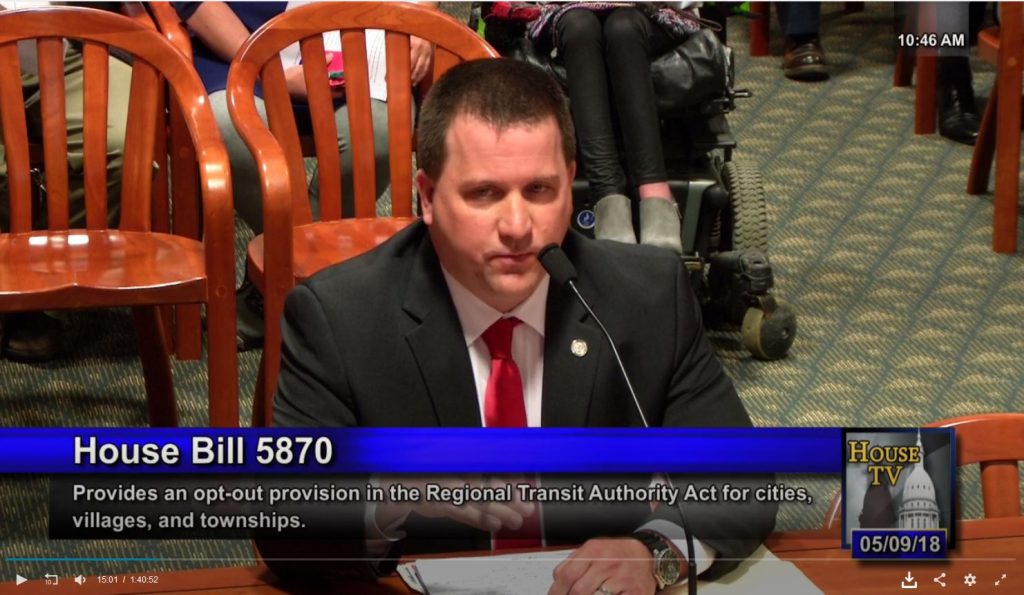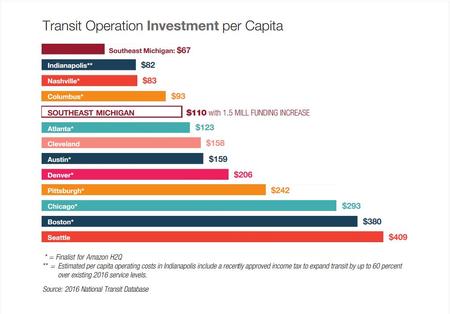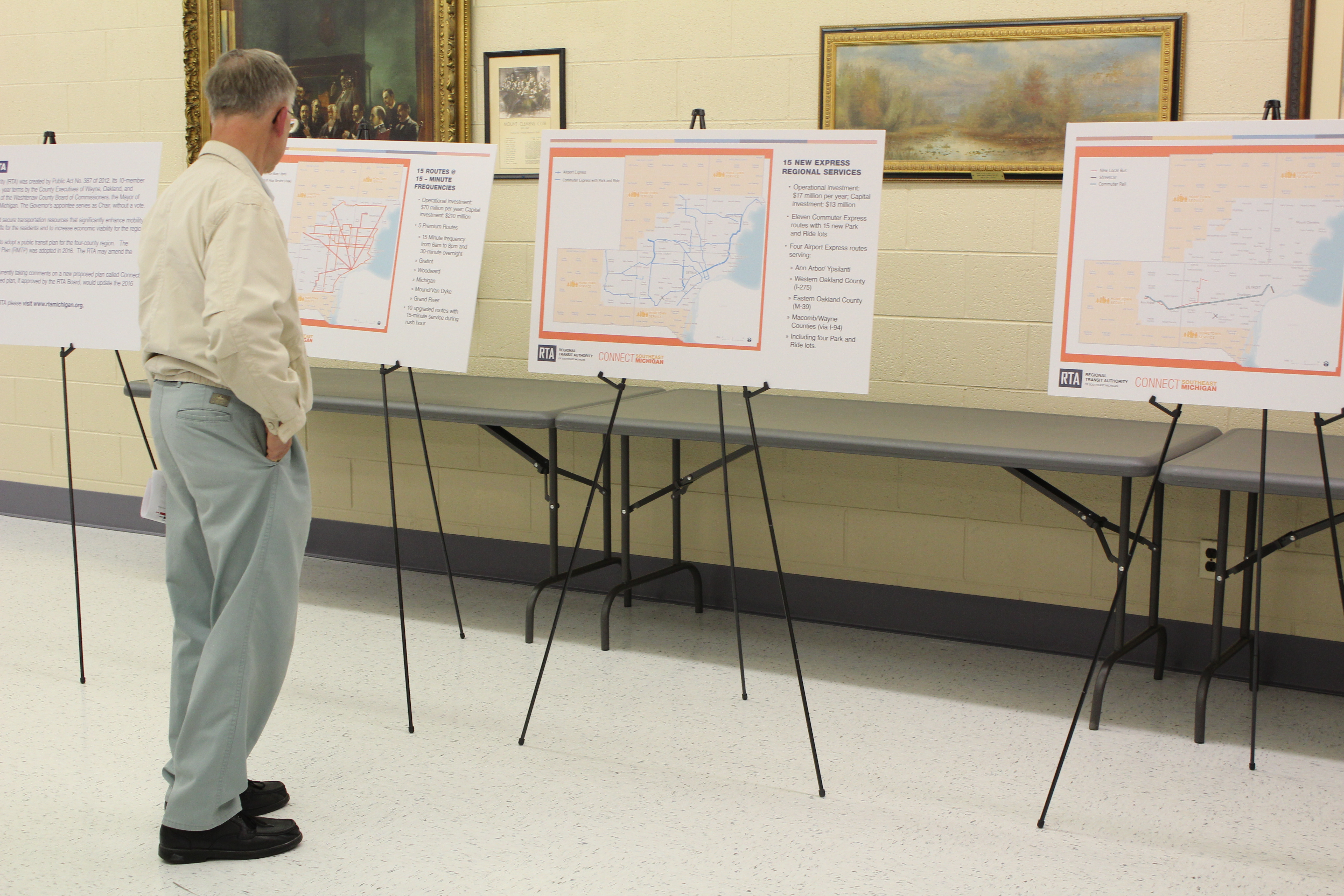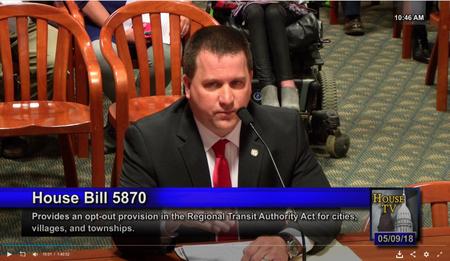Should Funding Regional Public Transit in Southeast Michigan Be Optional?
Communities in Southeast Michigan are already allowed to opt-out of paying for the SMART bus system that runs throughout the metro region.

The question of who should pay for public transportation in Southeast Michigan is once again up for debate. As part of a transportation series for Policy Meets the People: MI Voice, MI Vote, WDET takes a closer look at the option to opt-out of public transportation in the region.
Not Everyone Is Obligated to Pay
According to numbers presented by the Regional Transit Authority, Southeast Michigan pays $67 for public transit per capita. That’s $15 less than Indianapolis, $91 less than Cleveland, and $226 less than Chicago.

Part of the reason for that is that not every person in Southeast Michigan has to pay for regional transit.
Take, for example, the Suburban Mobility Authority for Regional Transportation, better known as the SMART bus system, that offers public transportation around Wayne, Macomb and Oakland Counties. Out of 127 communities, 51 don’t pay property taxes to help fund SMART. As a result, these 51 communities don’t receive major bus service.
The Case of Rochester Hills
That includes Rochester Hills. Resident Tendai Mangenja stopped in to fuel his vehicle at a gas station just outside the city, located halfway between playing fields and a shooting range. Rochester Hills is one of the communities that’s opted out of SMART, so residents don’t pay property taxes toward the service. Mangenja said there are probably some people who could benefit from SMART buses coming into Rochester Hills. But he added, “Around here, you won’t hear a lot of complaints.”

He said, most Rochester Hills residents, like him, own their own vehicles.
“I’ve never really had to use public transit so I’m kind of indifferent.”
In fact, other residents at this station said they did not even know that Rochester Hills opted out of SMART.
“To the best of my recollection we’ve never been a part of SMART,” said Rochester Hills Mayor Bryan Barnett.
This isn’t because residents voted against participating in the system. It’s because city leaders in Rochester Hills, like roughly 50 other metro Detroit communities, have not voted to join SMART. If they wanted to, they could follow the process laid out in Michigan’s Public Transportation Authority Act, or Act 196 of 1986, the legislation that allowed for SMART’s creation in 1989.
SMART millage requests don’t show up on ballots in places that haven’t joined the system. So in August, when SMART asks for 1 mill in property tax to continue to fund its operations, only voters in the 127 communities that have opted-in to the system will see the question on their ballots.
According to Act 196 of 1986, if city officials in communities like Rochester Hills voted to join SMART, then voters there would see millage requests on their ballots. But Barnett said he’s heard very little interest in that from his constituents.
“Frankly, as our community’s grown, we haven’t received an outpouring of requests about adding public transportation to Rochester Hills to date,” said Barnett. He notes the city does offer transportation for seniors through the Older Persons’ Commission. Barnett said he gets only about three requests a year from residents asking to join SMART.
Related Story: Southeast Michigan’s Transit Future Will be Decided at Polls
But that doesn’t necessarily mean the community is opposed to expanding public transportation. In 2016, 47 percent of Rochester Hills residents voted in favor of a 1.2 mill property tax proposed to fund a plan by the Regional Transit Authority of Southeast Michigan. In order to pass, the proposal needed a majority of voters across Oakland, Macomb, Wayne and Washtenaw counties to vote in favor of it. It failed by less than one percent.
New RTA Plan in Town
Now the RTA is back with a new draft plan. Once again, a commuter rail line would connect Ann Arbor and Detroit. Yet, like last time, the plan is primarily about buses. It would add routes and increase the frequency of bus service provided by SMART, the Detroit Department of Transportation and the Ann Arbor Area Transportation Authority. Unlike last time, the plan would also offer “hometown services” or funding that local municipalities away from major bus routes could apply toward things like ride-sharing or to bolster existing dial-a-ride service in their communities.

At a presentation of the plan in a library in Mt. Clemens, members of the audience expressed a number of concerns.
One attendee submitted a question on an index card asking why they aren’t allowed to get off the SMART bus when riding on Woodward Avenue through Bloomfield Hills. The reason is that Bloomfield Hills has opted out of SMART, and thereby does not receive bus service. To be clear, the RTA does not run SMART. But Eric Morris, a Vice President with HNTB Corporation who helped present the proposed RTA plan at the meeting, responded to the question by saying, “In this plan, you’d be able to get off in any community. In the RTA plan there are no opt-out communities.”
Unlike SMART, the Michigan legislation that created the RTA does not allow opt-outs. But a handful of Republicans in the state house are trying to change that.
A bill was recently introduced that would allow for communities like Rochester Hills, Bloomfield Hills and others, to not only avoid paying property taxes to SMART but also opt-out of paying into the RTA plan, should it get on the ballot and pass. It’s called House Bill 5870.
Making the RTA Optional
The bill’s sponsor is Representative Jeff Yaroch. He told members of the House Tax Policy Committee, at a May 9 meeting, that cities should not be forced to pay for a Regional Transit Authority millage.
“I think the point of this bill is to make sure that all our communities buy in to this if they’re going to vote for it,” said Yaroch.
His district includes communities like Richmond and Armada Township in Macomb County. He told members of the tax committee that the most northern constituent in his district lives 15 miles from the nearest bus on the RTA plan.
“15 miles!” said Yaroch. “You are not going to drive 15 miles so you can get on the bus.”
Bu Democratic State Representative Tenisha Yancey asked, “Do you know what percentage of people that would include?”
“I don’t have a percentage,” responded Yaroch. “The issue is, that person’s being asked to pay taxes for something that’s 15 miles away that fundamentally they aren’t going to use.”

CLICK HERE TO VIEW VIDEO
It’s an argument that comes up time and time again when debating transit in the region. But not everyone is moved by it.
“I thought it was ironic that a proposal that’s being made in the name of regional transit includes an opt-out provision” said former Democratic State Representative Jim Townsend. He helped shape the legislation that created the Regional Transit Authority in 2012, before leaving office two years ago because of term limits. Townsend said there’s a reason why opt-outs were not part of that legislation.
“The whole purpose of the Regional Transit Authority was to overcome the obstacles that opt-outs had already created,” he said.
That’s not to say there wasn’t talk of an opt-out provision.
“There were certainly interests and members of the legislature who insisted that opt-outs were necessary in order to pass the bill. But we stood firm as a coalition. And we said that opt-outs are completely antithetical, they are self-defeating. If you’re trying to create a regional transit system, you can’t create a system that is full of holes,” said Townsend.
But in Michigan, you can. It’s already the case with the SMART bus system. And it could be the case for the Regional Transit Authority if the plan even gets on the ballot in November.
Path to the Ballot
According to officials with the RTA, it is currently incorporating feedback from recent meetings into the draft plan. If a final plan is approved, then 7 of 9 RTA board members (with at least one from each of the four counties) would need to vote in favor of putting it on the ballot in order for it to end up before voters in November. According to draft board minutes from a May 17 meeting, this would need to happen before early July “to comfortably place a proposal on the ballot.” The next board meeting is tentatively scheduled for 2pm on June 21 at 1001 Woodward Ave., Suite 1400, Detroit, MI 48226.
Regardless of what happens with the RTA millage proposal, a SMART millage request of 1 mill will likely be on the August primary ballot for voters living in communities currently served by the suburban bus system. That includes all voters in Macomb County, 25 of 59 communities in Oakland County, and 27 of 44 communities in Wayne County. Detroit is not considered an opt-in community since it operates DDOT. The proposal will not be on the ballot for Detroit residents.
